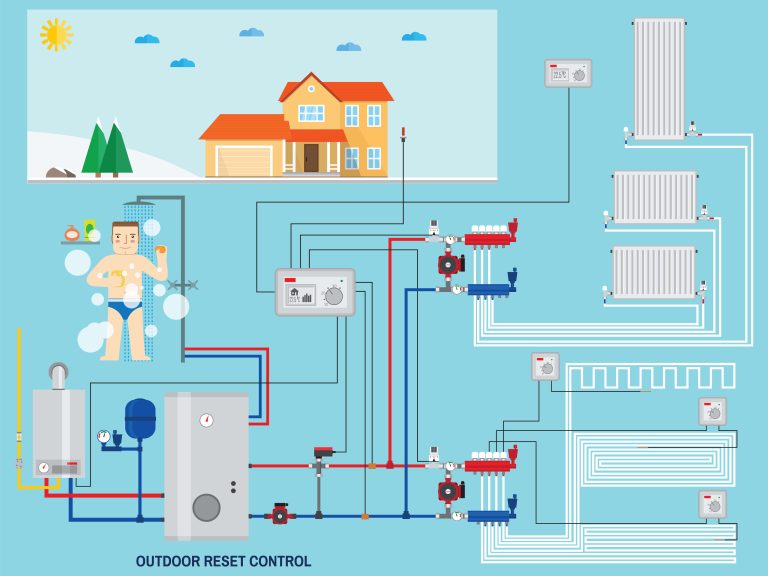Energy Efficient Heating and Hot Water
Energy-efficient heating and hot water storage system are a critical aspect of any household, providing warmth and comfort during cold seasons while also minimizing energy bills. Well insulated properties require less energy to maintain comfortable temperatures, whereas poorly insulated homes require much more energy to compensate for heat loss.
Many properties will have two sources of heat, the primary heating system and the secondary system. Typically the primary system is a gas or oil boiler whereas the secondary system might be a stove or an open fire. Both the primary and secondary systems, if applicable, are considered for the BER.
How water is heated and stored in a household will have a significant impact on the BER. This will be decided by the efficiency of the heat source, the time and temperature controls that are in place and the level of insulation around the water storage.
The level of control over a heating system is often not considered by property owners when it comes to the BER. But this can really affect bills and affect the rating. It is only possible to quantify this for each house individually, but there will be a big difference in BER between a property with limited controls and one with a modern control system.
Some upgrades to heating systems can be relatively simple, unobtrusive and fast to carry out for quick fix improvements to the BER, such as: swapping out a dated inefficient gas boiler for a new condensing boiler; installing a new hot water cylinder manufactured with a thick layer of insulation; and updating the controls for the heating system. The only SEAI grants available for central heating are for the installation of heat pumps and for heating control systems.
Heat Sources
The size of a property and the the amount of insulation it has will determine the heating requirements for the colder months. A more efficient heat source will use less energy than an inefficient one, saving money, improving the BER and reducing carbon emissions.
Each heat source is designed to use a specific fuel including: gas boilers; oil boilers; electricity powered heat pumps; wood burning stoves, coal fireplace… Each fuel type is taken into account for the BER as each will have a different amount of energy to give off per unit of weight, releasing different levels of carbon.
When upgrading the primary heating source of a property to an energy efficient heating system there are only a few common options that will get to the higher grades of BER, a heat pump, a condensing gas boiler, a condensing oil boiler or a modern wood burning boiler, each with modern controls and well insulated hot water storage. For the three boiler types, it is important to ensure that they have an efficiency of over 90% with some boilers achieving efficiency of 93%.
Because of the government drive for heat pump installations and lack of general understanding on heat pumps, we have a dedicated page explaining how they work and what to look out for when considering buying one. Learn more about heat pumps here.
An open fire is a very inefficient and expensive way to heat up a room and is bad for the BER. Significant amounts of heat is lost through inefficient burning of fuels, not to mention the amount of heat that is lost through draughts up the chimney when the fireplace is not in use. To maximise BER improvements, it is strongly recommended to block up the fireplace.
If sealing up the fireplace is not an option, then installing a wood burning stove should be considered. Try to avoid multi-fuel stoves and look out for the most energy efficient model as not all stoves are the same. If a property has been well insulated and has an efficient heating system, there will be no need for either option when it comes to producing heat.
Hot Water and Storage
Ensuring a comfortable supply of hot water in a household can be a very energy intensive process and finding the most efficient way of providing this will greatly improve the BER. There are two aspects to be considered when heating water, the heat source and the control you have over it. The more efficient the heat source, the less energy is required and the more control you have over the heating system, the less likely it is that an electric immersion will be used or that the water will be overheated at the wrong times.
If it is not possible to heat the water without the radiators heating up, then for the sake of the BER it is assumed that an immersion is used throughout the summer. Using the immersion requires a lot of electricity, it is the equivalent of using an electric kettle to provide a households hot water needs and is best avoided.
Old copper cylinders that do not have an insulation jacket lose heat at an incredibly quick rate. Even with an insulation jacket it is far from ideal. Modern cylinders are manufactured with a thick layer of insulation ensuring that, once heated, hot water from the morning remains available in the evening without requiring additional heating. It is also important to have a thermostat connected to the cylinder and the main heat controls so as to ensure that the water is not heated beyond the required temperature. This will prevent overheating, minimise energy use and improve the BER.
Depending on the amount of hot water required in a household at a given time, a combi boiler might be worth considering. A combi boiler heats water and delivers it directly to the taps, skipping the need for hot water storage. These are a great solution for small households as they free up space where the cylinder used to be and they ensure there is no wasting of unused hot water.
Heating Controls
Some properties have almost no control over their heating with only a simple on/off switch to be flicked when required. Others might have a bit more functionality but still be very limited. Heating systems with limited control usually heat the water even when it is not required, heat the property at the wrong times as well as heating areas of a property that are not being used.
Zoned heating is an essential and easy upgrade to make to a heating system. To get the biggest improvement out of the BER, three zones are required, 1 for each section of a property (usually ground floor and first floor) and 1 for hot water (this third zone is not required if a combi boiler is in place). The SEAI grants for installing modern heating controls are very generous. This should make installing this measure one of the first upgrades to be considered to maximise improving the BER while limiting the expense.

